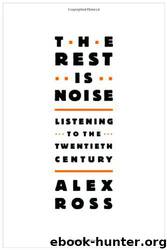The Rest Is Noise by Alex Ross

Author:Alex Ross [Ross, Alex]
Language: rus
Format: epub
Tags: General, Music, History, History & Criticism, 20th Century, Modern, Music - 20th century - History and criticism
ISBN: 9780312427719
Publisher: Macmillan
Published: 2008-10-14T07:00:00+00:00
On January 30, 1939, Hitler celebrated the sixth anniversary of his regime by delivering a major address to the Reichstag. Since the burning of the Reichstag building in 1933, the German parliament had carried out its business, now purely ceremonial, in the Kroll Opera House—where, in the Weimar time, Otto Klemperer had conducted Hindemith’s News of the Day and Stravinsky’s Oedipus Rex. In the same hall in 1933, a crippled parliament had passed the Enabling Act, which granted the Reich chancellor dictatorial powers. Now, in 1939, Hitler gave notice that his dominion would in short order encompass much of Europe and that those who stood in the way of destiny would face destruction. Goebbels, in his diaries, described Hitler’s speech as a “spacious” conception that built through an extended development of familiar themes to a potent climax. “Posterity must cherish his speech as a masterwork,” Goebbels wrote. “The ending of the speech is gripping and devastating. All are totally enthralled by it. The Führer is a true genius.”
This speech added two new themes to the familiar denunciation of the Jews: laughter and annihilation. “Very often in my life,” Hitler said, “I have been a prophet, and have generally been laughed at [ausgelacht].” He announced that it was now finally time to bring the Jewish problem to a “solution” whose sheer scope might wipe the smiles from the faces of his enemies: “I believe that the formerly resounding laughter of Jewry in Germany has now choked up in its throat.” Hitler made another prophecy: “If the international Jewish financiers inside and outside Europe should succeed in plunging the nations once more into a world war, then the result will not be the Bolshevization of the earth, and thus the victory of Jewry, but the annihilation [Vernichtung] of the Jewish race in Europe.”
Hitler repeated these themes in subsequent speeches. In September 1942 he said, “The Jews in Germany once laughed [haben einst…gelacht] at my prophecies. I do not know if they are still laughing today, or if their laughter has not already died down. I can only affirm now: their laughter will everywhere die down.” And in November of that year he said, “I have always been scorned [ausgelacht] as a prophet. Of those who formerly laughed [die damals lachten], untold numbers are no longer laughing today, and those who are still laughing may not be doing it for much longer.”
Hitler was announcing in coded language that the Final Solution was under way. What makes these speeches especially disturbing from the musical angle is that they may contain a Wagner reference. The sound of laughter echoes all through Parsifal. Kundry tells Parsifal of how she mocked Christ’s suffering on the way of the cross:
Download
This site does not store any files on its server. We only index and link to content provided by other sites. Please contact the content providers to delete copyright contents if any and email us, we'll remove relevant links or contents immediately.
| Biographies | Business |
| History & Criticism | Instruments |
| Musical Genres | Recording & Sound |
| Reference | Songbooks |
| Theory, Composition & Performance |
The Goal (Off-Campus #4) by Elle Kennedy(13647)
Kathy Andrews Collection by Kathy Andrews(11801)
Diary of a Player by Brad Paisley(7544)
What Does This Button Do? by Bruce Dickinson(6194)
Assassin’s Fate by Robin Hobb(6193)
Big Little Lies by Liane Moriarty(5782)
Altered Sensations by David Pantalony(5091)
Pale Blue Dot by Carl Sagan(4992)
Sticky Fingers by Joe Hagan(4182)
The Death of the Heart by Elizabeth Bowen(3601)
The Heroin Diaries by Nikki Sixx(3538)
Beneath These Shadows by Meghan March(3298)
Confessions of a Video Vixen by Karrine Steffans(3295)
How Music Works by David Byrne(3255)
The Help by Kathryn Stockett(3137)
Jam by Jam (epub)(3071)
Harry Potter 4 - Harry Potter and The Goblet of Fire by J.K.Rowling(3054)
Computational Linguistics and Intelligent Text Processing: 20th International Conference, CICLing 2019 La Rochelle, France, April 7â13, 2019 Revised Selected Papers, Part I by Alexander Gelbukh(2977)
Strange Fascination: David Bowie: The Definitive Story by David Buckley(2854)
